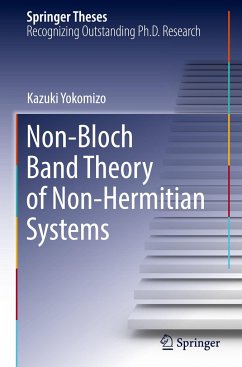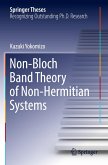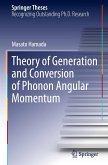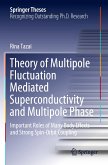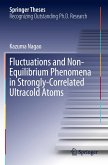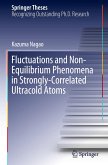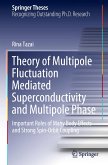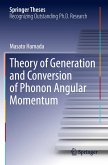This book constructs a non-Bloch band theory and studies physics described by non-Hermitian Hamiltonian in terms of the theory proposed here.
In non-Hermitian crystals, the author introduces the non-Bloch band theory which produces an energy spectrum in the limit of a large system size. The energy spectrum is then calculated from a generalized Brillouin zone for a complex Bloch wave number. While a generalized Brillouin zone becomes a unit circle on a complex plane in Hermitian systems, it becomes a circle with cusps in non-Hermitian systems. Such unique features of the generalized Brillouin zone realize remarkable phenomena peculiar in non-Hermitian systems.
Further the author reveals rich aspects of non-Hermitian physics in terms of the non-Bloch band theory. First, a topological invariant defined by a generalized Brillouin zone implies the appearance of topological edge states. Second, a topological semimetal phase with exceptional points appears, The topological semimetal phase is unique to non-Hermitian systems because it is caused by the deformation of the generalized Brillouin zone by changes of system parameters. Third, the author reveals a certain relationship between the non-Bloch waves and non-Hermitian topology.
In non-Hermitian crystals, the author introduces the non-Bloch band theory which produces an energy spectrum in the limit of a large system size. The energy spectrum is then calculated from a generalized Brillouin zone for a complex Bloch wave number. While a generalized Brillouin zone becomes a unit circle on a complex plane in Hermitian systems, it becomes a circle with cusps in non-Hermitian systems. Such unique features of the generalized Brillouin zone realize remarkable phenomena peculiar in non-Hermitian systems.
Further the author reveals rich aspects of non-Hermitian physics in terms of the non-Bloch band theory. First, a topological invariant defined by a generalized Brillouin zone implies the appearance of topological edge states. Second, a topological semimetal phase with exceptional points appears, The topological semimetal phase is unique to non-Hermitian systems because it is caused by the deformation of the generalized Brillouin zone by changes of system parameters. Third, the author reveals a certain relationship between the non-Bloch waves and non-Hermitian topology.
"Each chapter ends with a summary, and appendices are, where necessary, provided on useful concrete concepts and definitions in a very succinct and clear manner. The book is pedagogically written, and contains a list of rich and worthy references at the end of chapters." (Norbert Hounkonnou, zbMATH 1530.82002, 2024)

